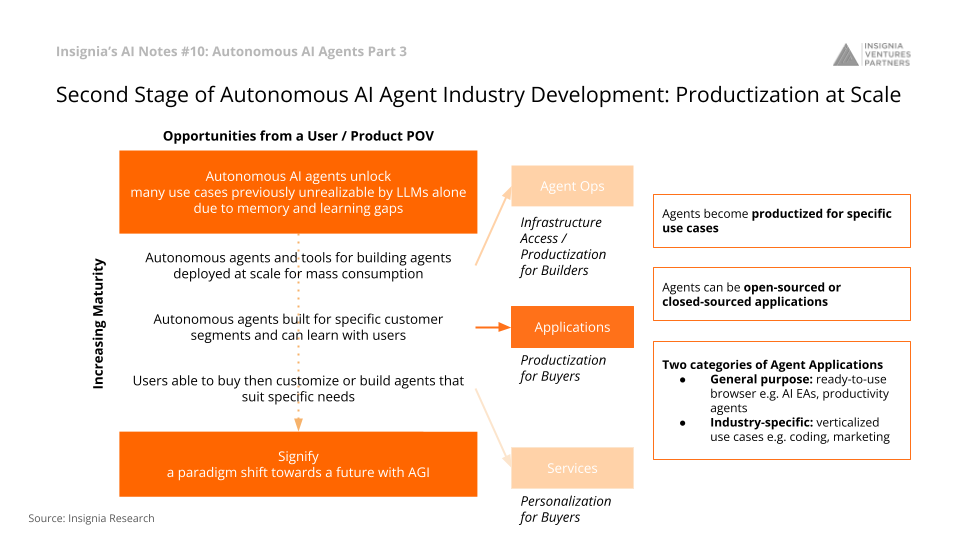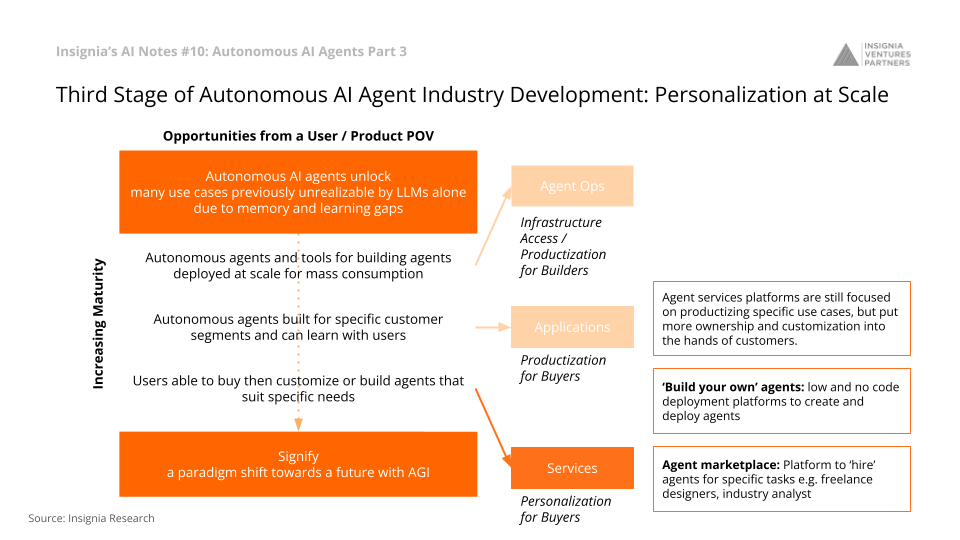As the Autonomous AI Agents landscape matures, it’s important to understand its multiple layers. These layers mark industry development in a way that runs parallel to how we have seen the internet evolve.
Broadly speaking, internet connectivity and smartphone devices were necessary for mobile applications to flourish in demand. In the same way, AgentOps is a necessary layer to enable wider development and adoption of agents as applications.
While we’ve covered the basics and the AgentOps sector in earlier articles, today we’re diving into the Applications and Services subsectors, focusing on the customization and specificity they bring to the table.
Get introduced to Autonomous AI Agents in our first article on the topic
A quick recap of subsectors in autonomous AI agents
- AgentOps: Infrastructure and tools for builders, aimed at mass deployment (read more on Agent Ops)
- Applications: Customer-segment-specific agents with learning capabilities
- Services: Customizable agents for buyers who have unique needs
Subsector: Applications — productization at scale

What’s the deal with AI agent applications?
In this phase, agents are productized for specific use cases, whether in open-source or closed-source applications. These agents find their applications in general-purpose utilities or industry-specific verticals.
Types of AI agent applications
- General purpose agents: These include AI executive assistants, productivity bots, coding agents, and more. Examples are Adept, a browser-based IDE for collaborative coding, and Replit, an agent that automates software processes.
- Industry-specific agents: Agents designed for verticalized uses in sectors like healthcare, law, or marketing. For instance, Intelllex offers an AI-powered Litigation Research Assistant.

Subsector: Services — personalization at scale

What’s the deal with autonomous AI agent services?
This sector focuses on platforms that allow more ownership and customization by the user. Think of it as the ‘DIY’ space for autonomous agents.
Types of autonomous AI agent services
- Build your own agents: Low and no-code platforms for crafting agents, like Inworld, which allows you to create AI NPCs in games.
- Agent marketplace: Platforms where one can ‘hire’ agents for specific tasks. An example is Character.ai, another platform for crafting AI NPCs in interactive experiences.

An overview of services: Commoditizing agents
AI agent application layer as the future of apps
As the industry of Autonomous AI Agents continues to evolve, the focus is increasingly shifting towards personalization and specialization through the Applications and Services subsectors. These layers not only offer productization at scale but also allow users to have more control over the involvement of AI in their everyday activities and workflows, be it through customization or specific use cases.
As we move further into this fascinating landscape, understanding these subsectors is crucial for stakeholders across the board — from builders and buyers to investors and end-users. Stay tuned for more insights into this ever-evolving field.
Author’s Note: This article was written with insights and research from our investment team. Reach out to them if you’re building in this space out of Southeast Asia and would like a deeper conversation.
 Paulo Joquiño is a writer and content producer for tech companies, and co-author of the book Navigating ASEANnovation. He is currently Editor of Insignia Business Review, the official publication of Insignia Ventures Partners, and senior content strategist for the venture capital firm, where he started right after graduation. As a university student, he took up multiple work opportunities in content and marketing for startups in Asia. These included interning as an associate at G3 Partners, a Seoul-based marketing agency for tech startups, running tech community engagements at coworking space and business community, ASPACE Philippines, and interning at workspace marketplace FlySpaces. He graduated with a BS Management Engineering at Ateneo de Manila University in 2019.
Paulo Joquiño is a writer and content producer for tech companies, and co-author of the book Navigating ASEANnovation. He is currently Editor of Insignia Business Review, the official publication of Insignia Ventures Partners, and senior content strategist for the venture capital firm, where he started right after graduation. As a university student, he took up multiple work opportunities in content and marketing for startups in Asia. These included interning as an associate at G3 Partners, a Seoul-based marketing agency for tech startups, running tech community engagements at coworking space and business community, ASPACE Philippines, and interning at workspace marketplace FlySpaces. He graduated with a BS Management Engineering at Ateneo de Manila University in 2019.
This article is the first part of a series on AI and was originally published in the Insignia Business Review.
TNGlobal INSIDER publishes contributions relevant to entrepreneurship and innovation. You may submit your own original or published contributions subject to editorial discretion.
Insignia AI Notes #9: Enabling the autonomous AI agent workflow with AgentOps

